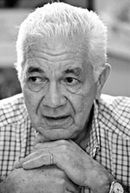Ivan Izquierdo
Ivan Antonio Izquierdo | |
|---|---|
 Dr. Ivan Izquierdo | |
| Born | 1937 |
| Citizenship | Argentinian Brazilian |
| Alma mater | University of Buenos Aires |
| Known for | Study of memory in mammals |
| Awards | Ordem Nacional do Mérito Científico Ordem de Rio Branco Doctor honoris causa, University of Buenos Aires |
| Scientific career | |
| Fields | Neurology Neurobiology |
| Institutions | Universidad Nacional de Córdoba Universidade Federal do Rio Grande do Sul Pontifícia Universidade Católica do Rio Grande do Sul |
Dr. Ivan Antonio Izquierdo is an Argentine Brazilian scientist and a pioneer in the study of the neurobiology of learning and memory. Born in 1937 in Buenos Aires, Argentina, Izquierdo has graduated in Medicine (1961) and completed his Ph.D. in Pharmacology (1962), both in the University of Buenos Aires (UBA).[1] For nearly a decade, Izquierdo taught at National University of Cordoba (UNC), in Argentina, but, due to a number of reasons, both political (the Argentinian dictatorship) and personal (his wife, Ivone, is Brazilian), he moved to Brazil in the beginning of the 1970s, and has lived in Porto Alegre since 1978. For more than 20 years, he has worked in the "Center of Memory" of the Biochemistry Department of the Health Basic Sciences Institute (ICBS) at the Federal University of Rio Grande do Sul (UFRGS), where he has had an enormous influence on young scientists: he has trained 42 Ph.D. students, most of whom hold academic research positions in universities in Brazil and elsewhere. Recently, he moved to the Pontificial Catholic University of Rio Grande do Sul (PUCRS) where he continues with his research.
Contributions
Ivan Izquierdo has made several key contributions to the understanding of the cellular basis of brain processes underlying memory storage and retrieval.[2][3][4][5][6][7] His research work is focused in the biological mechanisms of memory processes, employing multiple experimental approaches that range from behavioral psychobiology to neurochemistry, pharmacology, neurophysiology and experimental neurology, usually employing intracerebral microinfusions of drugs and assaying its effects upon different brain receptors, cellular processes, and, in particular, behavioral performance in different tasks. He was among the first to reveal the roles of epinephrine, dopamine, endogenous opioid peptides and acetylcholine in modulating memory consolidation and state-dependent memory retrieval. Later he has investigated benzodiazepine and GABAergic influences on memory. Some of his main achievements include the molecular bases of memory formation, retrieval, persistence and extinction in the mammal brain, the endogenous state dependency, and the functional discrimination between short and long-term memory.
Publications
Over the years, Ivan Izquierdo has published more than 500 scientific papers in refereed journals and was, for years, one of the most cited scientists in Brazil (and Latin America): 13 of his papers have been cited over 100 times, and since 1958 his papers have received over 10,000 citations. He has also published 17 books, 6 of which are fiction / chronicle, a recent, parallel avenue of personal interest.
Memberships
Member of several Academies of Sciences in Brazil and abroad - he was elected Foreign Member of the National Academy of Sciences, USA, on May 1, 2007 - and has earned more than 30 important national and international awards, including the highest civilian badge of honor of Brazil, the Ordem do Barão do Rio Branco" (2007). In Argentina, Izquierdo is the eighth person since 1821 to be named Honorary Professor of the University of Buenos Aires: the other seven were Nobel Laureates.
References
- ^ Trivedi, B. P. (2010). "Profile of Ivan Izquierdo". Proceedings of the National Academy of Sciences. 107 (34): 14947–14949. doi:10.1073/pnas.1010117107. PMC 2930525. PMID 20696922.
- ^ Izquierdo, I.; Medina, J. H. (1997). "Memory Formation: The Sequence of Biochemical Events in the Hippocampus and Its Connection to Activity in Other Brain Structures". Neurobiology of Learning and Memory. 68 (3): 285–316. doi:10.1006/nlme.1997.3799. PMID 9398590.
- ^ Izquierdo, I. N.; Barros, D. M.; Mello e Souza, T.; De Souza, M. M.; Izquierdo, L. A.; Medina, J. H. (1998). "Mechanisms for memory types differ". Nature. 393 (6686): 635–636. doi:10.1038/31371. PMID 9641675.
- ^ Izquierdo, I. N.; Bevilaqua, L. R. M.; Rossato, J. I.; Bonini, J. S.; Medina, J. H.; Cammarota, M. N. (2006). "Different molecular cascades in different sites of the brain control memory consolidation". Trends in Neurosciences. 29 (9): 496–505. doi:10.1016/j.tins.2006.07.005. PMID 16872686.
- ^ Bekinschtein, P.; Cammarota, M. N.; Igaz, L. M. L.; Bevilaqua, L. R. M.; Izquierdo, I. N.; Medina, J. H. (2007). "Persistence of Long-Term Memory Storage Requires a Late Protein Synthesis- and BDNF- Dependent Phase in the Hippocampus". Neuron. 53 (2): 261–277. doi:10.1016/j.neuron.2006.11.025. PMID 17224407.
- ^ Rossato, J. I.; Bevilaqua, L. R. M.; Izquierdo, I.; Medina, J. H.; Cammarota, M. (2009). "Dopamine Controls Persistence of Long-Term Memory Storage". Science. 325 (5943): 1017–1020. doi:10.1126/science.1172545. PMID 19696353.
- ^ Da Silva, W. C.; Cardoso, G.; Bonini, J. S.; Benetti, F.; Izquierdo, I. (2013). "Memory reconsolidation and its maintenance depend on L-voltage-dependent calcium channels and CaMKII functions regulating protein turnover in the hippocampus". Proceedings of the National Academy of Sciences. 110 (16): 6566. doi:10.1073/pnas.1302356110.
Sources
- 1937 births
- Brazilian people of Argentine descent
- Brazilian people of Croatian descent
- Brazilian people of Spanish descent
- Brazilian neuroscientists
- Argentine emigrants to Brazil
- Argentine people of Croatian descent
- Argentine people of Spanish descent
- Living people
- Naturalized citizens of Brazil
- People from Buenos Aires
- Members of the United States National Academy of Sciences
- Universidade Federal do Rio Grande do Sul faculty
- Expatriate academics in Brazil
